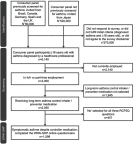Asthma impacts on workplace productivity in employed patients who are symptomatic despite background therapy: a multinational survey
- PMID: 31372003
- PMCID: PMC6636188
- DOI: 10.2147/JAA.S204278
Asthma impacts on workplace productivity in employed patients who are symptomatic despite background therapy: a multinational survey
Abstract
Background: Asthma affects millions of people worldwide, with many patients experiencing symptoms that affect their daily lives despite receiving long-term controller medication. Purpose: Work is a large part of most people's lives, hence this study investigated the impact of uncontrolled asthma on work productivity in adults receiving asthma maintenance therapy. Patients and methods: An online survey was completed by employed adults in Brazil, Canada, Germany, Japan, Spain and the UK. Participants were confirmed as symptomatic using questions from the Royal College of Physicians' 3 Questions for Asthma tool. The survey contained the Work Productivity and Activity Impairment - Specific Health Problem questionnaire and an open-ended question on the effect of asthma at work. Results: Of the 2,055 patients on long-term maintenance therapy screened, 1,598 were symptomatic and completed the survey. The average percentage of work hours missed in a single week due to asthma symptoms was 9.3%, ranging from 3.5% (UK) to 17.4% (Brazil). Nearly three-quarters of patients reported an impact on their productivity at work caused by asthma. Overall work productivity loss (both time off and productivity whilst at work) due to asthma was 36%, ranging from 21% (UK) to 59% (Brazil). When asked how asthma made participants feel at work, many respondents highlighted how their respiratory symptoms affect them. Tiredness, weakness and mental strain were also identified as particular challenges, with respondents describing concerns about the perception of colleagues and feelings of inferiority. Conclusions: This study emphasizes the extent to which work time is adversely affected by asthma in patients despite the use of long-term maintenance medication, and provides unique personal insights. Strategies to improve patients' lives may include asthma education, optimizing asthma management plans and running workplace well-being programs. Clinicians, employers and occupational health teams should be more aware of the impact of asthma symptoms on employees, and work together to help overcome these challenges.
Keywords: asthma; burden; costs; work productivity.
Conflict of interest statement
KGJ has spoken on behalf of, and worked as a consultant for, AstraZeneca, Boehringer Ingelheim International GmbH, Chiesi, GlaxoSmithKline, Mundipharma, Napp, Novartis and Pfizer, outside the submitted work. MT has received honoraria from the following companies marketing respiratory and allergy products: Aerocrine, Boehringer Ingelheim International GmbH, GlaxoSmithKline, Merck Sharp & Dohme, Novartis and Pfizer, outside the submitted work; he is also a member of the BTS/SIGN Asthma guideline steering group and the NICE Asthma Diagnosis and Monitoring guideline development group. MRR reports personal fees from AstraZeneca, Boehringer Ingelheim International GmbH, Chiesi, Menarini, Mundipharma, Novartis, Pfizer, Teva and Bial, and grants and personal fees from GlaxoSmithKline, outside the submitted work. JMF reports being a member of advisory boards for AstraZeneca, Boehringer Ingelheim International GmbH, Novartis, Sanofi-Regeneron, Circassia and Teva; has been paid honoraria for lecturing at symposia organized by these companies; and has also undertaken clinical trials through his employer, the University of British Columbia, for these companies and GlaxoSmithKline. Funding was also provided to the University of British Columbia by Boehringer Ingelheim International GmbH during the conduct of this study. In the last 5 years IP has received speaker’s honoraria for speaking at sponsored meetings from AstraZeneca, Boehringer Ingelheim International GmbH, Aerocrine, Almirall, Novartis, Teva, Chiesi and GlaxoSmithKline, and payments for organizing educational events from AstraZeneca and Teva. He has received honoraria for attending advisory panels with Genentech, Regeneron, AstraZeneca, Boehringer Ingelheim International GmbH, GlaxoSmithKline, Novartis, Teva, Merck, Sanofi, Circassia, Chiesi and Knopp. He has received sponsorship to attend international scientific meetings from Boehringer Ingelheim International GmbH, GlaxoSmithKline, AstraZeneca, Teva and Chiesi. He has received a grant from Chiesi to support a phase 2 clinical trial in Oxford. JMH is an employee of Boehringer Ingelheim International GmbH and UE is an employee of Boehringer Ingelheim Pharma GmbH & Co. KG. CV has spoken on behalf of, and worked as a consultant for, Boehringer Ingelheim International GmbH and Novartis. The authors report no other conflicts of interest in this work.
Figures






Similar articles
-
Insights, attitudes, and perceptions about asthma and its treatment: a multinational survey of patients from Europe and Canada.World Allergy Organ J. 2016 May 4;9:13. doi: 10.1186/s40413-016-0105-4. eCollection 2016. World Allergy Organ J. 2016. PMID: 27195057 Free PMC article.
-
The impact of a worksite migraine intervention program on work productivity, productivity costs, and non-workplace impairment among Spanish postal service employees from an employer perspective.Curr Med Res Opin. 2004 Nov;20(11):1805-14. doi: 10.1185/030079904X10151. Curr Med Res Opin. 2004. PMID: 15537481
-
Working while unwell: Workplace impairment in people with severe asthma.Clin Exp Allergy. 2018 Jun;48(6):650-662. doi: 10.1111/cea.13153. Epub 2018 May 17. Clin Exp Allergy. 2018. PMID: 29676834
-
Survey of asthma management in Thailand - the asthma insight and management study.Asian Pac J Allergy Immunol. 2015 Mar;33(1):14-20. doi: 10.12932/AP0473.33.1.2015. Asian Pac J Allergy Immunol. 2015. PMID: 25840629
-
Psychosocial working conditions as determinants of asthma self-management at work: A systematic review.J Asthma. 2018 Oct;55(10):1095-1104. doi: 10.1080/02770903.2017.1396469. Epub 2017 Dec 4. J Asthma. 2018. PMID: 29200315
Cited by
-
Health-related quality of life in severe hypersensitivity reactions: focus on severe allergic asthma and hymenoptera venom anaphylaxis-a cross-sectional study.Front Psychol. 2024 Aug 23;15:1394954. doi: 10.3389/fpsyg.2024.1394954. eCollection 2024. Front Psychol. 2024. PMID: 39246313 Free PMC article.
-
Prevalence and burden of asthma in five European countries: a retrospective cross-sectional study.BMJ Open. 2025 May 23;15(5):e085175. doi: 10.1136/bmjopen-2024-085175. BMJ Open. 2025. PMID: 40409961 Free PMC article.
-
Quality of life and work functionality in severe asthma patients: the impact of biological therapies.J Occup Med Toxicol. 2024 Mar 20;19(1):8. doi: 10.1186/s12995-024-00406-9. J Occup Med Toxicol. 2024. PMID: 38509562 Free PMC article.
-
Transgenerational effects of bisphenol S exposure on the development of experimental asthma.J Environ Sci Health C Toxicol Carcinog. 2025;43(3):228-242. doi: 10.1080/26896583.2025.2507408. Epub 2025 May 27. J Environ Sci Health C Toxicol Carcinog. 2025. PMID: 40432332
-
Adding Chinese Herbal Medicine to Routine Care is Associated With a Lower Risk of Rheumatoid Arthritis Among Patients With Asthma: A Population-Based Retrospective Cohort Study.Front Pharmacol. 2022 Aug 17;13:895717. doi: 10.3389/fphar.2022.895717. eCollection 2022. Front Pharmacol. 2022. PMID: 36059972 Free PMC article.
References
-
- GBD. 2015 Chronic Respiratory Disease Collaborators. Global, regional, and national deaths, prevalence, disability-adjusted life years, and years lived with disability for chronic obstructive pulmonary disease and asthma, 1990–2015: a systematic analysis for the Global Burden of Disease Study 2015. Lancet Respir Med. 2017;5(9):691–706. doi:10.1016/S2213-2600(17)30293-X - DOI - PMC - PubMed
-
- Global Initiative for Asthma. GINA report: global strategy for asthma management and prevention. Available from: http://ginasthma.org/2018-gina-report-global-strategy-for-asthma-managem.... Accessed October 22, 2018.
LinkOut - more resources
Full Text Sources

